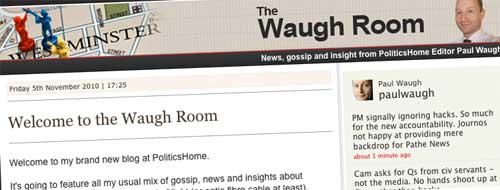
Evening Standard deputy political editor Paul Waugh starts his new job this morning, as editor of (increasingly paywalled) website PoliticsHome.com. Mildly interesting in itself, as evidence of the still-growing influence of online in the political space, although far from the first time a ‘proper’ journalist has gone over to the blogs’ side.
What’s quite interesting is the mechanics of the move itself. His final post on the Standard’s (Typepad-powered) blog gave full details of his new job, and where you’d be able to follow him – including direct links to his new home page. I find it very hard to imagine any other media outlet being so relaxed about a star reporter or columnist ‘taking his readers / audience with him’.
Equally intriguing is the fact that his (personal) Twitter account has just kept going as it always did.
[blackbirdpie url=”http://twitter.com/paulwaugh/status/593819410112512″]
Despite the on-page linking and the background wallpaper – Standard last week, PolHome this morning – Waugh ‘owns’ this particular channel of communication… and its almost 10,000 followers. He isn’t dependent on his employer’s infrastructure, or brand, to talk to his audience.
Former BBC man James Cridland, now a ‘radio futurologist’ (?), wrote an excellent piece about this issue 18 months ago, in the context of radio presenters moving jobs. His rather draconian-sounding conclusion was this – although it’s worth noting the dissent, some from known names in the industry, in the ensuing comments:
Give your presenters official Twitter feeds for your station, and make it clear that they can only promote these. XFM is doing the right thing here, since it has a set of them – @daveberry_xfm is Dave Berry, for example – but this is clearly part of the station’s output. Ensure that -you- retain the password, and ensure that you actively monitor what they say (just like you monitor what they say on-air.) That way, when you part company with that presenter, you can communicate this fact to their followers your way – and, crucially, you stay in control.
[Over the next couple of days, James also offered opinions on promoting personal websites (in short: no) and email addresses (likewise), stirring similar levels of controversy.]
So whether he realises it or not, Paul is offering an interesting case study in what constitutes ‘brand’ in the world of third-party online services. When communications infrastructure was difficult, employers could keep control. When we’re all just a few seconds away from creating our own Twitter / Facebook accounts, the employer is left with little more than guidelines. And perhaps a rather weak argument about using company resources for personal purposes.
I really enjoy Paul’s stuff: and I’d happily be subscribing to his new blog right now… except that somehow, the website – running on a bespoke platform which happily ‘ingests’ other people’s RSS feeds – can’t offer an RSS feed of its own, although one is promised ‘soon’. (FYI: it’s two months since prominent blogger Waugh’s move was announced.)
Oh, and by the way, PoliticsHome – disabling the ability to right-click on your pages… really?